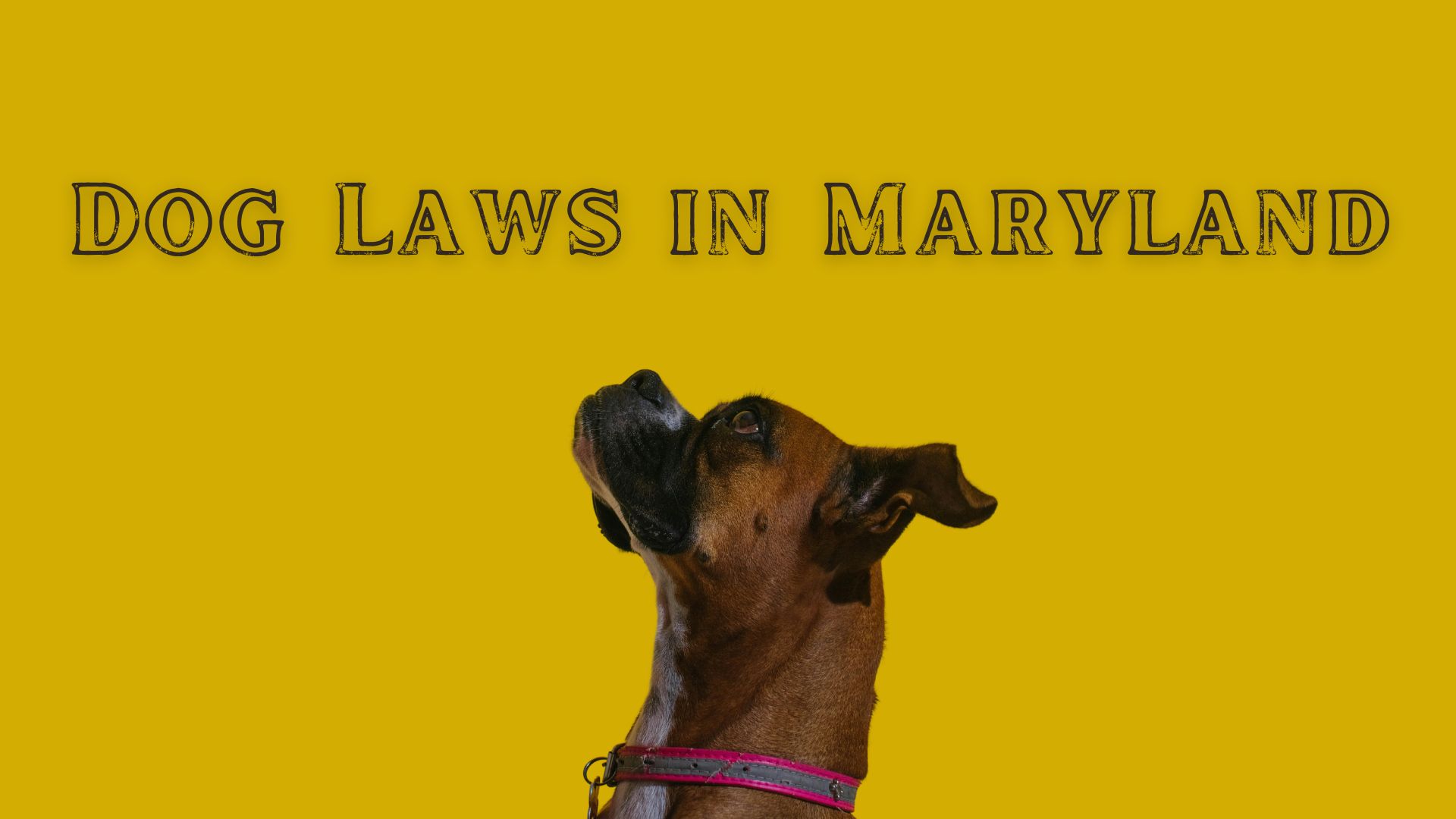Dog Laws in Maryland
As a dog owner in the United States, with over 69 million canine companions gracing our homes, understanding dog laws is crucial. Not only do these laws protect our furry friends, but they also ensure responsible pet ownership and a harmonious coexistence with our communities. Dog laws in Maryland encompass a wide range of areas, from licensing and vaccination requirements to leash laws and regulations around public spaces. By familiarizing ourselves with these legalities, we can ensure our beloved pups have a safe, happy, and legal life in Maryland.
Table of Contents
Dog Bite Laws in Maryland
Maryland boasts stunning landscapes, vibrant cities, and a welcoming atmosphere – perfect for both humans and their furry companions. However, ensuring a safe and harmonious environment for everyone requires understanding the legalities surrounding dog bites. This comprehensive guide explores Maryland’s dog bite laws, empowering you to be a responsible dog owner and advocate for the safety of all.

Dog Bite Laws in Maryland
Maryland’s dog bite laws are designed to promote responsible pet ownership and hold dog owners accountable for their animal’s actions. Here’s a breakdown of the key aspects:
Strict Liability vs. One-Bite Rule
Unlike some states with the “one-bite rule,” Maryland operates under a strict liability system. This means a dog owner can be held liable for any injuries or property damage caused by their dog, regardless of the dog’s past behavior.
Presumption of Knowledge
The law presumes that the dog owner knew, or should have known, of their dog’s vicious or dangerous propensities. This presumption can be rebutted if the owner can prove they took reasonable precautions to prevent the bite.
Exceptions to Strict Liability
There are a few exceptions to Maryland’s strict liability law:
- Trespassing: If the victim was trespassing on the dog owner’s property when bitten, the owner might not be held liable.
- Provocation: If the victim provoked the dog, the owner’s liability might be reduced or eliminated.
- Working or Service Dogs: Specific laws might apply to bites inflicted by working or service dogs while performing their duties.
Importance of Responsible Ownership
While the law might offer some protection to victims, preventing dog bites in the first place is paramount. Responsible ownership practices include:
- Proper Training and Socialization: Train your dog to be obedient and comfortable around people and other animals.
- Leash Control: Always leash your dog in public spaces and maintain control at all times.
- Secure Fencing: Ensure your yard is securely fenced to prevent your dog from escaping.
- Understanding Your Dog’s Temperament: Be aware of your dog’s individual personality and potential triggers.
What to Do After a Dog Bite
If you or someone you know is bitten by a dog, take these steps immediately:
- Seek Medical Attention: Ensure the victim receives prompt medical attention to clean and treat the wound to prevent infection.
- Report the Bite: Report the incident to animal control to document the attack and initiate any necessary investigations.
- Gather Evidence: If possible, take pictures of the bite wound, the dog, and the scene of the incident. Collect witness information if available.
- Consult an Attorney: Consider contacting an attorney specializing in personal injury law to understand your legal options and potential compensation for medical bills and other damages.
Additional Considerations
- Dog Owner’s Insurance: Most homeowner’s or renter’s insurance policies offer liability coverage for dog bites. However, coverage limits and exclusions might apply.
- Dangerous Dog Designation: Depending on the severity of the bite and the dog’s history, authorities might designate the dog as dangerous, requiring additional owner requirements like muzzling, leash restrictions, and secure confinement.
Maryland Statutes Related to Dog Bites
Here are some key Maryland statutes related to dog bites:
- Maryland Code, Agriculture Section 3-1901: Outlines the strict liability dog bite law and presumption of knowledge.
- Maryland Code, Article 27, Section 1204: Addresses animal control procedures and potential quarantine for biting dogs.
- Maryland Code, Article 83, Section 21: Covers potential criminal charges associated with a dog bite incident.
Dog Barking and Noise Laws in Maryland
Maryland’s vibrant communities offer a welcoming environment for both humans and their canine companions. However, maintaining a peaceful coexistence sometimes requires addressing excessive dog barking. This comprehensive guide explores Maryland’s dog barking and noise laws, empowering you to be a responsible dog owner and promote a harmonious neighborhood environment.

Limited State-Level Regulations
Unlike some states with specific decibel limits or time restrictions, Maryland currently has no state-wide laws directly addressing dog barking. However, this doesn’t mean excessive barking goes unchecked. Local governments and noise ordinances play a crucial role.
Focus on Local Noise Ordinances
The primary legal framework for addressing excessive dog barking in Maryland lies with local noise ordinances. These ordinances vary by county or municipality and often address a broader range of noise disturbances beyond barking dogs.
Local Noise Ordinance
To determine the specific regulations regarding dog barking in your area, you can:
- Visit your county or municipality’s website: Most local government websites provide easy access to noise ordinances and contact information for animal control.
- Contact your local animal control office: Animal control officers can provide information on the specific noise ordinance applicable to your area and potential enforcement procedures.
General Considerations for Excessive Dog Barking
While specific decibel limits might not be defined, some general principles often apply in Maryland’s local noise ordinances:
- Unreasonable Duration and Frequency: Barking that persists for extended durations or occurs frequently throughout the day or night might be considered a violation.
- Disruption of Peace and Quiet: The key concern is whether the barking disrupts the reasonable peace and quiet of the neighborhood.
- Reasonableness Standard: Local authorities often consider the context and circumstances surrounding the barking when determining a violation.
Addressing Excessive Dog Barking
Beyond the legal considerations, here are some approaches to address excessive dog barking and promote a harmonious neighborhood environment:
- Identify the Cause: Understanding why your dog barks excessively is crucial for addressing the behavior. Common reasons include boredom, anxiety, territoriality, or seeking attention.
- Positive Reinforcement Training: Employ positive reinforcement training techniques like treats, praise, and redirection to discourage unwanted barking and teach your dog appropriate behavior.
- Environmental Enrichment: Provide your dog with ample physical and mental stimulation through regular walks, playtime, and interactive toys to reduce boredom-related barking.
- Desensitization and Counterconditioning: If your dog barks at specific triggers like noises or people outside, work with a professional trainer to gradually desensitize them and develop positive associations with these stimuli.
- Addressing Underlying Medical Issues: Sometimes, excessive barking might indicate an underlying medical condition like pain or anxiety. Consult your veterinarian to rule out any medical factors contributing to the behavior.
What to Do if Your Dog is Barking Excessively
If you’re concerned about your dog’s barking or have received complaints from neighbors:
- Proactively Address the Issue: Don’t wait for complaints to take action. Start working on addressing the underlying cause of your dog’s barking.
- Communicate with Neighbors: Talk to your neighbors directly and explain you’re actively addressing the barking issue.
- Seek Professional Help: Consider consulting a certified animal behaviorist or trainer for personalized guidance and training techniques.
Resources for Addressing Dog Barking
Here are some resources to help you address excessive dog barking in Maryland:
- The Maryland Veterinary Medical Association (MVMA): [1] Offers resources on animal behavior and can connect you with veterinarians specializing in dog training and behavior.
- The American Society for the Prevention of Cruelty to Animals (ASPCA) – Dog Training: [2] Provides information on positive reinforcement training methods to address unwanted barking.
- Association of Professional Dog Trainers (APDT): [3] Connects you with certified professional dog trainers in your area.
Dog Poop Disposal Laws in Maryland
Maryland boasts stunning landscapes, vibrant cities, and a welcoming atmosphere for dog owners and their furry companions. However, maintaining a clean and enjoyable environment for everyone requires responsible pet ownership, and a key aspect of that is proper dog poop disposal. This comprehensive guide explores dog poop disposal laws in Maryland, empowering you to be a responsible dog owner and contribute to a cleaner, healthier state.

Dog Poop Disposal Laws in Maryland
While Maryland lacks a single, state-wide law mandating dog poop disposal, the responsibility falls on local governments to establish regulations. This means the specific legalities regarding dog poop disposal can vary by county or municipality.
Local Ordinances and Codes
The primary legal framework for dog poop disposal in Maryland lies with local ordinances and codes. These ordinances often address a broader range of pet waste management issues, promoting responsible ownership and a clean environment.
Local Dog Poop Disposal Ordinance
To determine the specific dog poop disposal requirements in your area, you can:
- Visit your county or municipality’s website: Most local government websites provide easy access to relevant ordinances and contact information for animal control.
- Contact your local animal control office: Animal control officers can provide information on the specific ordinance applicable to your area and potential enforcement procedures.
General Considerations for Dog Poop Disposal
While specific details might vary, some general principles often apply in Maryland’s local dog poop disposal ordinances:
- Immediate Pick-Up: Most ordinances require dog owners to immediately pick up their dog’s waste after elimination in public spaces.
- Carrying Appropriate Disposal Bags: Carrying and utilizing disposable bags for waste collection is often mandatory.
- Proper Disposal: Disposing of collected waste in designated trash receptacles or pet waste stations is usually required.
Fines and Penalties for Non-Compliance
Failure to comply with local dog poop disposal ordinances can result in fines and penalties. These can vary depending on the specific ordinance and the number of offenses.
Responsible Dog Poop Disposal
Beyond legal considerations, responsible dog poop disposal offers several benefits:
- Public Health: Dog waste can contain harmful bacteria and parasites that pose health risks to humans and other animals. Proper disposal minimizes these risks.
- Environmental Protection: Left unattended, dog waste can contaminate waterways and disrupt ecosystems. Responsible disposal protects our environment.
- Community Cleanliness: Dog waste left behind creates an unpleasant environment for everyone. Picking up after your dog promotes a clean and pleasant community.
Tips for Responsible Dog Poop Disposal
Here are some tips to ensure you’re a responsible dog owner when it comes to poop disposal:
- Always carry disposable bags: Make it a habit to carry a sufficient number of biodegradable poop bags on every walk.
- Double-bagging for messy situations: Consider double-bagging waste in particularly messy situations for added security and odor control.
- Look for designated pet waste stations: Many parks and public spaces provide pet waste stations with disposal bins. Utilize these whenever available.
- Dispose of waste properly: Tie the bag securely and deposit it in a designated trash receptacle or pet waste station. Never leave bags behind.
Promoting Responsible Dog Ownership
Several initiatives in Maryland promote responsible dog poop disposal:
- Public Awareness Campaigns: Many local governments and animal welfare organizations launch campaigns to educate pet owners about the importance of proper waste disposal.
- Distribution of Free Poop Bags: Some organizations and businesses offer free poop bags to encourage responsible ownership.
- Installation of Pet Waste Stations: Increasing the availability of designated disposal stations provides convenient options for pet owners.
Dog Licensing Laws in Maryland
Living in Maryland with your furry friend offers a lifetime of adventures. From exploring vibrant cities to chasing squirrels through scenic landscapes, responsible pet ownership is key to a happy life for both you and your dog. A crucial aspect of responsible ownership in Maryland is dog licensing. This comprehensive guide delves into Maryland’s dog licensing laws, empowering you to ensure your canine companion is properly registered and contributes to a safer community.

The Importance of Dog Licensing in Maryland
Dog licensing in Maryland serves several essential purposes:
- Public Safety: Licensing helps animal control track and locate lost dogs, facilitating a quicker reunion with their owners.
- Rabies Control: Licensing often verifies a dog’s current rabies vaccination, a crucial public health measure.
- Community Protection: Licensing fees help fund animal control services, including stray animal care, shelter operations, and enforcement of animal welfare laws.
- Responsible Ownership: Obtaining a license demonstrates your commitment to responsible pet ownership and adherence to state regulations.
Understanding Maryland’s Dog Licensing Laws
Maryland’s dog licensing laws are overseen by the Maryland Department of Agriculture (MDA) but implemented at the local level by counties and municipalities. Here’s a breakdown of the key aspects:
- Licensing Age Requirement: All dogs four months of age or older residing in Maryland must be licensed.
- Licensing Location: Licenses are typically obtained from your county or municipality’s animal control office, town clerk’s office, or online through authorized platforms.
- Licensing Validity Period: The validity period for dog licenses can vary by location. Some counties issue licenses annually, while others offer multi-year options.
- Licensing Fees: Licensing fees also vary by location and might depend on factors like the dog’s age, sterilization status, and rabies vaccination status. Discounts are often available for sterilized dogs.
Required Information for Dog Licensing
When applying for a dog license in Maryland, you’ll typically need to provide the following information:
- Dog’s Name and Breed
- Proof of Rabies Vaccination: A current rabies vaccination certificate from a licensed veterinarian is mandatory.
- Sterilization Status (Optional): Proof of spaying or neutering can qualify you for discounted licensing fees.
- Your Contact Information: This ensures animal control can reach you if your dog gets lost.
Renewal of Dog Licenses
Dog licenses in Maryland typically require renewal before the expiration date. Renewal procedures might involve submitting a new application or simply paying the renewal fee online or at the designated office. Late fees might apply for missed renewals.
Exemptions from Dog Licensing
In some cases, exemptions from dog licensing might be available. Here are some potential scenarios:
- Service Dogs: Qualified service dogs with proper identification are usually exempt from licensing fees.
- Working Dogs: Certain working dogs, such as those used by law enforcement or herding livestock, might have specific licensing requirements or exemptions depending on their function.
- Short-Term Stays: If your dog is only in Maryland for a short visit (less than 30 days), licensing might not be required. Always check local regulations for temporary stays.
Consequences of Non-Compliance
Failure to license your dog in Maryland can result in fines and penalties. The specific penalties can vary by location but might involve:
- Fines: Fines for unlicensed dogs can range from minor administrative fees to more significant penalties for repeat offenses.
- Impoundment: Unlicensed dogs might be impounded by animal control and subject to additional fees for boarding and daily care until licensed and claimed by their owner.
Local Dog Licensing Information
To access specific details regarding dog licensing requirements, fees, and application procedures in your area, you can:
- Visit your county or municipality’s website: Most local government websites provide comprehensive information on dog licensing and animal control services.
- Contact your local animal control office: Animal control officers can answer your questions and guide you through the licensing process.
Additional Considerations
Here are some additional points to consider:
- Microchipping: While not a legal requirement for dog licensing, microchipping your dog significantly increases the chances of a safe recovery if they get lost.
- Multi-Dog Discounts: Some localities offer discounts for licensing multiple dogs from the same household.
- Lost or Stolen Licenses: Report lost or stolen licenses to your local animal control office to obtain a replacement.
Dog Leash Laws in Maryland
Maryland, with its vibrant cities, scenic parks, and charming towns, offers a haven for both humans and their canine companions. However, ensuring a safe and harmonious environment for everyone requires responsible dog ownership practices, including leash laws. This comprehensive guide explores dog leash laws in Maryland, empowering you to enjoy safe walks with your furry friend while respecting the rights of others.

Dog Leash Laws in Maryland
Unlike some states with uniform leash laws, Maryland operates on a decentralized system. This means leash laws are primarily established and enforced at the local level by counties and municipalities. Here’s a breakdown of the key aspects:
- Local Focus: The specific requirements and regulations regarding dog leashes can vary depending on your location in Maryland.
- State Minimum Standard: While no state-wide leash law exists, Maryland does have a minimum standard outlined in the Agriculture Code. This standard requires dogs to be confined on the owner’s property or under the owner’s immediate control by a substantial leash no longer than fifteen (15) feet when off-premises.
- Local Variations: Counties and municipalities can enact stricter leash laws than the state minimum standard. These might involve:
- Leash Length Restrictions: Some localities might mandate shorter leash lengths than the state’s 15-foot allowance.
- Leash-Free Zones: Designated areas like dog parks often permit off-leash activities under responsible supervision.
- Specific Leash Requirements: Certain regulations might specify leash materials or require hands-free leashes for better control.
Your Local Dog Leash Law
To determine the exact leash laws applicable to your area, you can:
- Visit your county or municipality’s website: Most local government websites provide information on animal control regulations, including leash laws.
- Contact your local animal control office: Animal control officers can answer your questions and clarify specific leash requirements in your area.
General Considerations for Dog Leash Laws
While details might differ, some general principles often apply to leash laws in Maryland:
- Maintaining Control: The core principle is ensuring your dog is under your immediate control, preventing them from posing a threat to people or other animals.
- Public Spaces: Leashes are generally mandatory in public spaces like streets, sidewalks, parks (unless designated off-leash zones), and trails.
- Responsible Ownership: Even in off-leash areas, responsible ownership requires ensuring your dog’s good behavior and immediate recall when necessary.
Benefits of Following Dog Leash Laws
Following dog leash laws benefits everyone in the community:
- Public Safety: Leashes help prevent dog bites and other potential altercations between dogs or with people.
- Animal Safety: Leashes protect dogs from running into traffic, getting lost, or encountering other dangers.
- Peace of Mind: Leashes ensure a more predictable and enjoyable experience for both dog owners and others sharing public spaces.
Tips for Walking Your Dog on a Leash
Here are some tips for enjoyable and safe walks with your dog on a leash:
- Choose the Right Leash: Select a leash with a comfortable length and material suitable for your dog’s size and temperament.
- Practice Leash Training: Train your dog to walk calmly and loosely on a leash to avoid constant pulling or tension.
- Maintain Focus and Control: Pay attention to your dog while walking and maintain control of the leash to prevent them from lunging or getting tangled with other dogs or people.
- Be Respectful of Others: Be mindful of others using the same space and avoid walking your dog too close to people or animals who might feel uncomfortable.
Understanding Off-Leash Areas
While leash laws are essential for public safety, designated off-leash areas provide safe spaces for dogs to socialize and exercise freely. Here’s what to consider when visiting dog parks or off-leash zones:
- Know Your Dog: Ensure your dog is well-socialized and has good recall before letting them off-leash in an unfamiliar environment.
- Respect Park Rules: Most off-leash areas have specific rules regarding park use, waste disposal, and dog behavior. Familiarize yourself with these rules beforehand.
- Maintain Supervision: Even in off-leash zones, responsible ownership requires remaining attentive and ready to intervene if necessary.
- Clean Up After Your Dog: Always carry waste disposal bags and pick up after your dog to maintain a clean and responsible environment.
Dangerous Dog Laws in Maryland
Maryland strives to create a safe and harmonious environment for both residents and their furry companions. This includes a framework for addressing potentially dangerous dogs. This comprehensive guide explores Maryland’s dangerous dog laws, empowering you to understand your rights and responsibilities as a dog owner and contribute to a safer community.
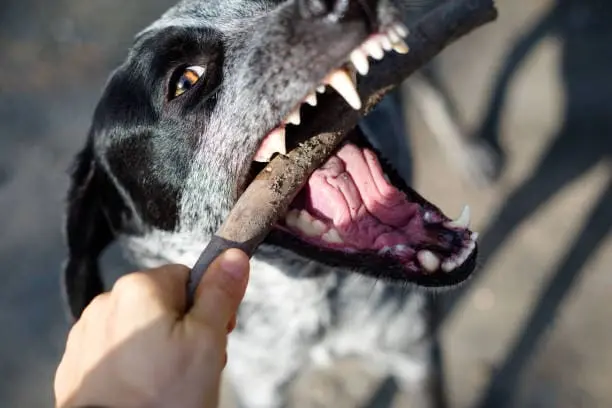
Dangerous Dog Laws in Maryland
Maryland’s dangerous dog laws are designed to promote responsible pet ownership and hold dog owners accountable for the actions of their animals classified as dangerous. Here’s a breakdown of the key aspects:
- Identification of Dangerous Dogs
- Two-Part Test: Maryland law employs a two-part test to determine if a dog is considered dangerous.
- First Part: The dog must have inflicted a serious injury on a person or another domestic animal without provocation.
- Second Part: There must be a reasonable likelihood that the dog will inflict serious injury on another person or domestic animal in the future.
- Director’s Discretion: The Maryland Department of Agriculture (MDA) Director, after considering relevant evidence, ultimately determines if a dog meets the criteria for being classified as dangerous.
- Two-Part Test: Maryland law employs a two-part test to determine if a dog is considered dangerous.
Potential Triggers for Dangerous Dog Designation
While the specific circumstances are evaluated on a case-by-case basis, some situations might raise concerns and potentially trigger a dangerous dog investigation:
- Serious Dog Bite Incidents: A documented dog bite that results in a serious injury to a person or another animal, especially without provocation, can trigger an investigation.
- History of Aggressive Behavior: A history of aggressive behavior towards people or other animals, even if no serious injuries resulted, might be considered.
- Complaints from Neighbors: Multiple complaints from neighbors regarding aggressive or threatening behavior by a dog can prompt an investigation.
Process for Dangerous Dog Designation
If an incident or complaint suggests a dog might be dangerous, the following steps might occur:
- Investigation: Animal control officers or designated authorities might investigate the incident, gather evidence, and interview witnesses.
- Hearing: The dog owner might be entitled to a hearing to present their case and evidence before a designated official.
- Dangerous Dog Designation: If the evidence supports the two-part test, the dog might be classified as dangerous.
Responsibilities of Dangerous Dog Owners
Dog owners whose pets are classified as dangerous in Maryland face additional responsibilities:
- Registration: The dog must be registered with the local animal control agency.
- Muzzling and Leashing: The dog must be muzzled and leashed whenever off the owner’s property.
- Secure Confinement: The dog must be securely confined on the owner’s property, often with specific requirements for fencing and signage.
- Potential Insurance Requirements: Some localities might require additional liability insurance for owners of dangerous dogs.
Appealing a Dangerous Dog Designation
If your dog is classified as dangerous, you might have the right to appeal the decision. The specific process for appeals can vary depending on your location, so consult with an attorney specializing in animal law for guidance.
Preventing Dangerous Dog Situations
The best approach to dangerous dog situations is prevention:
- Responsible Ownership: Provide proper training, socialization, and positive reinforcement to ensure your dog’s well-being and good behavior.
- Understanding Your Dog’s Temperament: Be aware of your dog’s individual personality and potential triggers to avoid situations that might lead to aggression.
- Spay/Neuter: Spaying and neutering your dog can reduce territorial and aggressive behavior in some cases.
- Obedience Training: Invest in professional obedience training to teach your dog basic commands and promote good manners in public spaces.
Resources for Responsible Dog Ownership
Here are some resources to help you be a responsible dog owner in Maryland:
- The Maryland Department of Agriculture (MDA): [4] Offers information on animal control regulations and potentially dangerous dogs.
- The American Society for the Prevention of Cruelty to Animals (ASPCA) – Dog Training: [5] Provides resources on positive reinforcement training techniques to address potential behavioral issues.
- Association of Professional Dog Trainers (APDT): [6] Connects you with certified professional dog trainers in your area.
Dog Health and Welfare Laws in Maryland
Maryland, with its stunning landscapes and vibrant communities, welcomes both residents and their canine companions. However, ensuring the well-being of our furry friends extends beyond walks and playtime. This comprehensive guide explores dog health and welfare laws in Maryland, empowering you to be a responsible pet owner and advocate for your dog’s health and happiness.
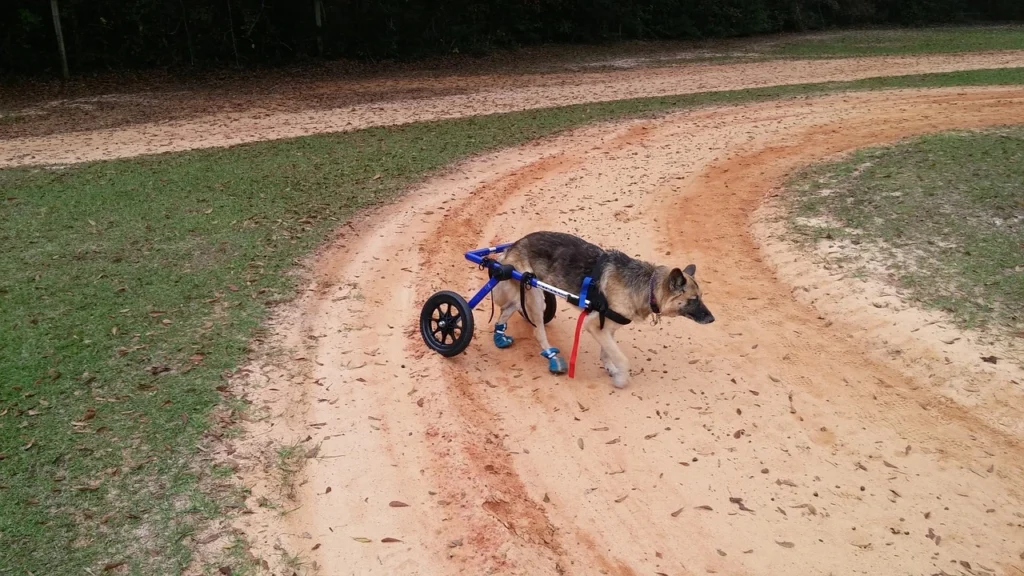
Focus on General Animal Welfare Laws
Maryland lacks a single, codified set of dog-specific health and welfare laws. Instead, the state primarily relies on broader animal welfare statutes enforced by the Maryland Department of Agriculture (MDA) and local animal control agencies.
Key Principles of Animal Welfare Laws
These laws uphold fundamental principles for all animals, including dogs:
- Prevention of Cruelty: Intentionally inflicting pain, suffering, or death on an animal is prohibited.
- Provision of Basic Needs: Owners are responsible for providing adequate food, water, shelter, and veterinary care.
- Prevention of Neglect: Animals must be protected from abandonment, exposure to the elements, and unsanitary living conditions.
Enforcing Animal Welfare Laws
Enforcement of animal welfare laws in Maryland involves a collaborative effort:
- Maryland Department of Agriculture (MDA): The MDA oversees animal welfare regulations and provides resources for animal control agencies.
- Local Animal Control Agencies: These agencies investigate complaints of animal cruelty and neglect, and can remove animals from abusive situations.
- Law Enforcement: Police officers can intervene in animal cruelty cases and enforce relevant laws.
Reporting Animal Cruelty or Neglect
If you suspect a dog is being neglected or abused, you have a responsibility to report it. Here’s how you can help:
- Contact your local animal control agency: This is the first point of contact for reporting suspected animal cruelty or neglect.
- Call the Maryland Department of Agriculture (MDA) Animal Welfare Complaint Line: 1-410-841-5970 (weekdays) or 1-800-492-5782 (24/7)
- File a report online: Some animal control agencies might offer online reporting options.
Additional Considerations for Dog Health and Welfare
While not strictly legal mandates, these additional aspects significantly contribute to a dog’s well-being in Maryland:
- Rabies Vaccination: Maryland law requires all dogs over four months of age to be vaccinated against rabies. Vaccination protects both your dog and the community from this deadly disease.
- Microchipping: Microchipping your dog significantly increases the chances of a safe recovery if they get lost. While not mandatory, it’s a highly recommended practice.
- Breeding Regulations: Maryland has no state-wide breeding regulations. However, some local municipalities might have specific ordinances related to dog breeding kennels or restrictions on certain breeds.
Preventing Dog Fighting
Dog fighting is a serious crime in Maryland, punishable by fines and imprisonment. Additionally, owning, training, or promoting dogs for fighting purposes is strictly prohibited.
Resources for Responsible Dog Ownership
Here are some resources to help you be a responsible dog owner in Maryland:
- The Maryland Department of Agriculture (MDA) Animal Health Section: [7] Provides information on rabies vaccination requirements and other animal health topics.
- The Maryland Veterinary Medical Association (MVMA): [8] Offers resources on finding a veterinarian, animal care best practices, and responsible pet ownership.
- The American Society for the Prevention of Cruelty to Animals (ASPCA): [9] Provides a wealth of information on dog care, training, and responsible ownership.
Dog Public Access Laws in Maryland
Maryland boasts vibrant communities, picturesque landscapes, and a welcoming atmosphere for dog owners and their furry companions. However, navigating public spaces with your canine friend requires understanding dog public access laws. This comprehensive guide explores these laws in Maryland, empowering you to enjoy responsible outings with your dog while respecting the rights of others.

Understanding Dog Public Access Laws in Maryland
Maryland’s dog public access laws operate on a decentralized system. This means specific regulations regarding dogs in public spaces are primarily established and enforced at the local level by counties and municipalities.
Local Ordinances
The allowance or restrictions for dogs in various public spaces will vary depending on your location in Maryland. Here’s a breakdown of the key points:
- Local Variations: Counties and municipalities can enact ordinances governing dog access in public spaces like parks, beaches, trails, restaurants, and stores. These might include:
- Complete Bans: Certain areas might completely prohibit dogs, often for safety or sanitation reasons.
- Leash Requirements: Most public spaces mandate dogs be on leash at all times. Leash length restrictions might also be specified.
- Designated Off-Leash Areas: Many localities have designated dog parks or off-leash zones where dogs can run freely under responsible supervision.
- Business-Specific Policies: Individual businesses, like restaurants or shops, have the discretion to determine whether dogs are permitted and under what conditions (e.g., leashed, well-behaved).
Local Dog Public Access Laws
To determine the specific laws governing dog access in public spaces within your area, you can:
- Visit your county or municipality’s website: Most local government websites provide information on animal control regulations and public access for dogs in various settings.
- Contact your local animal control office: Animal control officers can answer your questions and clarify specific regulations regarding dog access in public parks, trails, and other public spaces.
- Check with individual businesses: For shops, restaurants, or other private establishments, inquire about their specific pet policies before bringing your dog.
General Considerations for Dog Public Access Laws
While details may differ, some general principles often apply to dog public access laws in Maryland:
- Responsible Ownership: The core principle is ensuring your dog’s good behavior and maintaining control, preventing them from posing a threat to people or other animals.
- Respecting Others: Be mindful of individuals who might be uncomfortable around dogs and avoid forcing interactions.
- Cleaning Up After Your Dog: Always carry waste disposal bags and pick up after your dog to maintain a clean environment.
Benefits of Following Dog Public Access Laws
Following dog public access laws benefits everyone in the community:
- Public Safety: Proper leash control and designated off-leash zones minimize potential conflicts between dogs or with people.
- Sanitation: Responsible pet ownership, including waste disposal, ensures public spaces remain clean and enjoyable for everyone.
- Respectful Coexistence: Understanding and adhering to regulations fosters a more harmonious environment for dog owners, non-dog owners, and businesses.
Enjoying Public Spaces with Your Dog
Here are some tips for enjoying public spaces with your dog responsibly:
- Know Before You Go: Research the specific regulations of your chosen location and ensure your dog meets any requirements (e.g., leash length, vaccination status).
- Ensure Proper Leash Control: Maintain control of your dog on a leash at all times in designated leash-required areas.
- Practice Good Dog Etiquette: Train your dog to be well-behaved in public, avoiding excessive barking, jumping, or pulling on the leash.
- Respect Other Park Users: Be mindful of others and avoid allowing your dog to encroach on personal space.
- Clean Up After Your Dog: Always carry and use waste disposal bags to pick up after your dog, leaving the area clean for everyone.
Understanding Service Animals
Federal law protects the rights of individuals with disabilities to be accompanied by service animals in public spaces. Service animals are specially trained to perform tasks to assist their handlers with disabilities. It’s important to distinguish service animals from emotional support animals, which do not have the same public access rights.
Dog Travel and Transportation Laws in Maryland
Maryland, with its charming towns, scenic landscapes, and exciting travel opportunities, welcomes both residents and their furry companions. But before hitting the road with your canine friend, understanding dog travel and transportation laws in Maryland is crucial. This comprehensive guide explores these regulations, empowering you to ensure a safe and legal journey for you and your dog.

General Considerations for Dog Travel in Maryland
While Maryland lacks specific, state-wide regulations governing dog travel, some general principles are essential:
- Vaccinations: Ensure your dog is up-to-date on all required vaccinations, including rabies. Vaccination records might be requested when crossing state lines or entering specific facilities.
- Health Certificate: For some interstate travel or boarding facilities, a health certificate from a licensed veterinarian might be necessary.
- Microchipping: Microchipping your dog significantly increases the chances of a safe recovery if they get lost while traveling.
Local Regulations
While Maryland lacks overarching dog travel laws, some local regulations might apply:
- Public Transportation: Many public transportation systems, like buses or trains, might have restrictions on dog size, breed, or requirement for carriers. Always check the specific policies of the chosen transportation provider before traveling.
- Pet-Friendly Accommodations: Research and choose pet-friendly hotels, motels, or vacation rentals that allow dogs and understand any associated pet fees or restrictions.
Traveling with Your Dog in Your Vehicle
There’s no state-wide law in Maryland mandating specific methods for securing your dog while traveling in a vehicle. However, the following considerations prioritize safety and responsible pet ownership:
- Safe Transport: Always prioritize your dog’s safety. Consider using a crate or harness secured to the vehicle’s anchor points to prevent them from becoming projectiles in case of an accident.
- Comfort: Ensure your dog has enough space to move comfortably and avoid overheating. Provide proper ventilation and frequent rest stops to allow your dog to stretch and relieve themselves.
- No Distractions: Never allow your dog to roam freely in the vehicle, as it can be distracting for the driver and pose a safety hazard.
Laws for Traveling with Your Dog Across State Lines
When traveling across state lines, additional regulations might apply:
- Rabies Vaccination Requirements: While rabies vaccination is mandatory in Maryland, some states might have stricter vaccination requirements for incoming animals. Research the specific regulations of your destination state.
- Health Certificates: Certain states might require a health certificate issued by a licensed veterinarian within a specific timeframe before your dog’s entry.
Resources for Planning Your Dog-Friendly Trip
Here are some resources to help you plan a safe and enjoyable dog-friendly trip:
- The U.S. Department of Agriculture (USDA) Animal and Plant Health Inspection Service (APHIS) Pet Travel Website: [10] Provides information on pet travel regulations across state lines and internationally.
- The American Veterinary Medical Association (AVMA) Website: [11] Offers resources on traveling with pets, including tips on pet health and safety during travel.
Additional Considerations for Dog Travel
Here are some additional points to consider for a successful dog-friendly trip:
- Preparation: Familiarize your dog with their travel crate or carrier beforehand to ensure comfort. Pack essential supplies, including food, water, waste disposal bags, bowls, medications, and a leash.
- Pet Identification: Ensure your dog has a collar with identification tags, including your contact information and microchip information.
- Pet-Friendly Activities: Research dog-friendly destinations, parks, and activities to include your canine companion in your travel adventures.
Dog Housing and Accommodation Laws in Maryland
Maryland, with its vibrant cities and charming communities, welcomes both residents and their furry companions. However, navigating the world of housing and finding a place that accommodates both you and your canine friend can be tricky. This comprehensive guide explores dog housing and accommodation laws in Maryland, empowering you to make informed decisions and ensure a smooth living arrangement for you and your dog.

Dog Housing and Accommodation Laws in Maryland
Maryland, like many states, lacks a single, overarching set of dog housing and accommodation laws. Here’s a breakdown of the key aspects to consider:
- Fair Housing Act (FHA): This federal law prohibits discrimination in housing based on several factors, including disability. While not explicitly mentioning pets, the FHA protects the rights of individuals with disabilities to have reasonable accommodations for service animals in “no-pet” housing facilities.
- State and Local Laws: Maryland currently lacks state-wide laws specifically addressing dog housing and accommodation. Regulations are primarily established at the local level by counties and municipalities.
Navigating “No-Pet” Policies
Many rental properties in Maryland might have “no-pet” policies. However, the FHA protects tenants with disabilities who require service animals from such restrictions. Here’s a breakdown of what you need to know:
- Service Animal vs. Emotional Support Animal (ESA): The FHA protects the rights of individuals with disabilities to have service animals, which are specially trained to perform tasks to assist their handlers. ESAs, while providing emotional support, are not protected by the FHA in terms of housing.
- Reasonable Accommodation: Landlords are obligated to provide reasonable accommodations for qualified service animals in “no-pet” housing. This could include waiving pet fees or breed restrictions.
- Verification of Disability and Service Animal: Landlords can request documentation verifying the tenant’s disability and the service animal’s training and qualifications.
Finding Dog-Friendly Housing
While navigating “no-pet” policies can be complex, there are ways to find dog-friendly housing in Maryland:
- Research: Look for apartments or rentals advertised as “pet-friendly” or those allowing dogs.
- Contact Landlords Directly: Inquire about pet policies and any associated fees or restrictions before applying.
- Online Resources: Several online platforms list dog-friendly rentals and can simplify your search.
Dog-Friendly Housing Policies
When you find dog-friendly housing, it’s crucial to understand the specific policies:
- Pet Fees: Many dog-friendly rentals have pet fees, which can be one-time deposits or monthly charges.
- Breed Restrictions: Some rentals might have breed restrictions based on size, weight, or perceived aggression.
- Number of Pets: Landlords might limit the number of dogs allowed per household.
- Pet Deposit: A pet deposit might be required in addition to the regular security deposit.
- Pet Rules and Regulations: Leash requirements, noise restrictions, and waste disposal procedures might be outlined in the lease agreement.
Being a Responsible Dog Owner in Your Rented Home
Living with a dog in a rented property requires responsible ownership:
- Abide by Lease Agreement: Follow all pet-related clauses in your lease agreement to avoid potential lease violations or fines.
- Maintain a Clean and Damage-Free Environment: Clean up after your dog promptly and address any pet-related damage promptly.
- Be a Considerate Neighbor: Minimize barking or disruptive behavior that might disturb other tenants.
Additional Considerations for Dog Housing and Accommodation
Here are some additional points to consider:
- Homeownership: Homeowners’ associations (HOAs) might have specific pet rules or restrictions. Familiarize yourself with these before purchasing a property.
- Pet Insurance: Consider pet insurance to help cover potential veterinary costs or damage caused by your dog.
- Landlord-Tenant Disputes: If you encounter issues regarding pet policies or reasonable accommodation requests, consult with a lawyer specializing in landlord-tenant law.
Dog Adoption and Sale Laws in Maryland
Maryland welcomes not only residents but also their furry companions. Whether you’re considering adopting a dog in need of a loving home or purchasing a pup from a breeder, understanding the dog adoption and sale laws in Maryland is crucial. This comprehensive guide explores the legalities surrounding acquiring a dog, empowering you to make informed decisions and ensure a responsible and ethical experience.

Dog Adoption and Sale Laws in Maryland
Maryland’s approach to dog acquisition utilizes a two-pronged strategy:
- Promoting Dog Adoptions: The state prioritizes finding loving homes for dogs in shelters and rescue organizations.
- Regulating Dog Sales: Measures are in place to ensure responsible breeding practices and protect animal welfare for dogs acquired through sales.
The Rise of Dog Adoption
In 2020, Maryland enacted the “No More Puppy and Kitten Mills” act, effectively banning the retail sale of dogs and cats in pet stores. This shift encourages potential dog owners to consider adoption as their primary option.
Benefits of Dog Adoption
Adopting a dog from a shelter or rescue offers numerous benefits:
- Saving a Life: You provide a loving home for a dog in need.
- Variety of Breeds and Ages: Shelters and rescues house dogs of various breeds, mixes, and ages, increasing the chances of finding the perfect match.
- Transparent Adoption Process: Reputable shelters provide detailed information about a dog’s medical history, temperament, and needs.
- Affordable Adoption Fees: Adoption fees are typically much lower than purchasing a dog from a breeder.
Finding Your Perfect Adoptable Match
Here’s how to find your perfect adoptable canine companion in Maryland:
- Research Shelters and Rescues: Numerous reputable shelters and rescue organizations operate throughout Maryland. Research their websites and adoption processes.
- Adoption Events: Many shelters and rescues host adoption events where you can meet adoptable dogs in person.
- Consider Your Lifestyle: Be honest about your lifestyle and living situation to ensure a good fit for both you and the dog.
Dog Sale Regulations in Maryland
While retail pet store sales are banned, Maryland allows dog sales from reputable breeders:
- Breeder Licensing: Breeders selling dogs must obtain a kennel license from the Maryland Department of Agriculture (MDA).
- Animal Welfare Standards: Licensed breeders are subject to inspections to ensure adherence to minimum animal welfare standards for housing, sanitation, and veterinary care.
- Consumer Protections: Maryland has limited consumer protection laws regarding dog sales. Thorough research and responsible breeder selection are crucial.
Finding a Reputable Dog Breeder
If you choose to purchase a dog from a breeder, prioritize responsible breeders who prioritize animal welfare:
- Kennel Club Membership: Look for breeders who are members of reputable kennel clubs like the American Kennel Club (AKC) that enforce breed standards and ethical breeding practices.
- Breeder Reputation: Research the breeder’s reputation online and seek recommendations from veterinarians or dog owners familiar with the breeder.
- On-Site Visit: Always schedule an on-site visit to the breeding facility to assess the dog’s living conditions, meet the parents, and ask questions about health testing and socialization practices.
Additional Considerations for Dog Adoption and Sale
Here are some additional points to keep in mind:
- Microchipping: Ensure your adopted or purchased dog is microchipped for identification purposes.
- Vaccinations: Verify that your new dog is up-to-date on all essential vaccinations.
- Spaying/Neutering: Many shelters and rescues adopt out dogs already spayed or neutered. Reputable breeders might offer spaying/neutering options for purchased puppies.
- Licensing: All dogs over four months old in Maryland must be licensed with your local animal control agency.
Dog Park and Recreation Laws in Maryland
Maryland, with its scenic landscapes and vibrant communities, welcomes both residents and their canine companions. However, navigating dog-friendly recreation areas requires understanding the regulations in place. This comprehensive guide explores dog park and recreation laws in Maryland, empowering you to enjoy safe and responsible outings with your furry friend.

Dog Park and Recreation Laws in Maryland
Maryland employs a decentralized system for dog park and recreation laws. This means specific regulations regarding dogs in parks, trails, and recreation areas are primarily established and enforced at the local level by counties and municipalities.
Local Ordinances
The allowance or restrictions for dogs in various recreation areas will vary depending on your location in Maryland. Here’s a breakdown of the key points:
- County and Municipal Ordinances: Counties and municipalities can enact ordinances governing dog access in public recreation areas like:
- Dog Parks: Designated areas where dogs can run freely under responsible supervision. Specific rules for park usage, like leash requirements or breed restrictions, might apply.
- Trails and Hiking Areas: Some trails and hiking areas might allow dogs on leash, while others might be completely off-limits.
- Public Beaches and Parks: Regulations regarding dogs on beaches or public parks can vary, with some areas allowing leashed dogs, while others might have complete bans.
Finding Your Local Dog Park and Recreation Laws
To determine the specific laws governing dog access in public recreation areas within your area, you can:
- Visit your county or municipality’s website: Most local government websites provide information on animal control regulations and dog access in various settings.
- Contact your local animal control office: Animal control officers can answer your questions and clarify specific regulations regarding dog access in parks, trails, and other public recreation areas.
- Check park signage: Most parks and recreation areas will have signage outlining specific dog access rules and leash requirements.
General Considerations for Dog Park and Recreation Laws
While details may differ at the local level, some general principles often apply to dog park and recreation laws in Maryland:
- Responsible Ownership: The core principle is ensuring your dog’s good behavior and maintaining control, preventing them from posing a threat to people or other animals.
- Respecting Others: Be mindful of individuals who might be uncomfortable around dogs and avoid forcing interactions.
- Cleaning Up After Your Dog: Always carry waste disposal bags and pick up after your dog to maintain a clean environment.
Benefits of Following Dog Park and Recreation Laws
Following dog park and recreation laws benefits everyone:
- Public Safety: Proper leash control and designated off-leash zones minimize potential conflicts between dogs or with people.
- Sanitation: Responsible pet ownership, including waste disposal, ensures public recreation areas remain clean and enjoyable for everyone.
- Respectful Coexistence: Understanding and adhering to regulations fosters a more harmonious environment for dog owners, non-dog owners, and park users.
Enjoying Dog Parks Responsibly
Here are some tips for enjoying dog parks responsibly:
- Know Before You Go: Research the specific rules of your chosen dog park and ensure your dog meets any requirements (e.g., spayed/neutered, up-to-date vaccinations).
- Proper Leash Use: Leash your dog outside the designated off-leash area and maintain control at all times.
- Supervise Your Dog: Never leave your dog unattended in a dog park. Remain vigilant and intervene if necessary to prevent conflicts.
- Respectful Play: Be mindful of other dogs and their body language. Ensure your dog engages in appropriate play behaviors.
- Clean Up After Your Dog: Always carry and use waste disposal bags to pick up after your dog, leaving the park clean for everyone.
Exploring Dog-Friendly Trails and Recreation Areas
Here are some tips for exploring dog-friendly trails and recreation areas:
- Leash Your Dog: Unless specifically designated as an off-leash area, always keep your dog on a leash on trails and in public recreation areas.
- Be Mindful of Wildlife: Respect the natural environment and keep your dog leashed to minimize disturbances to wildlife.
- Leave No Trace: Practice responsible pet ownership by picking up after your dog and adhering to all park regulations.
- Respect Other Trail Users: Yield to other trail users, especially hikers or cyclists, and maintain control of your dog to avoid potential conflicts.
Dog Food and Nutrition Laws in Maryland
Maryland, a state known for its charm and diverse communities, welcomes both residents and their canine companions. But ensuring your furry friend thrives goes beyond just tail wags and walks in the park. Providing proper nutrition is crucial for their health and well-being. This comprehensive guide explores dog food and nutrition laws in Maryland, empowering you to make informed choices about your dog’s diet.

Dog Food and Nutrition Laws in Maryland
Unlike some states, Maryland does not have specific laws directly regulating the ingredients or labeling of commercially available dog food. However, the state relies on the federal framework established by the U.S. Food and Drug Administration (FDA) to ensure the safety and quality of pet food products.
The Role of the FDA in Dog Food Regulation
The FDA sets forth guidelines for the manufacturing, labeling, and marketing of pet food in the United States. Here are some key aspects to consider:
- Good Manufacturing Practices (GMPs): The FDA mandates that pet food manufacturers adhere to GMPs to ensure product safety and consistency.
- Labeling Requirements: Pet food labels must follow specific guidelines regarding information such as the product name, ingredient list, guaranteed analysis, and nutritional adequacy statement.
- Product Recalls: The FDA has the authority to recall pet food products deemed unsafe or that violate regulations.
Choosing the Right Dog Food for Your Pup
While there are no state-mandated regulations on dog food content in Maryland, here are some crucial factors to consider when choosing food for your canine companion:
- Nutritional Needs: Dogs have varying nutritional needs based on age, breed, activity level, and overall health. Consult your veterinarian to determine the best diet for your dog.
- Ingredient Quality: Look for dog food made with high-quality, whole-food ingredients and a balanced source of protein, carbohydrates, fats, vitamins, and minerals.
- AAFCO Statements: The Association of American Feed Control Officials (AAFCO) establishes nutrient profiles for dog food. Look for AAFCO statements on the label indicating the food meets their requirements for a specific life stage (e.g., growth, maintenance, all life stages).
- Brand Reputation: Research the reputation of dog food brands, considering factors like ingredient sourcing, manufacturing practices, and customer reviews.
Additional Considerations for Dog Food and Nutrition
Here are some additional points to keep in mind:
- Raw Diets: While some pet owners choose raw food diets, these can be nutritionally unbalanced and pose a higher risk of foodborne illness for both you and your dog. Consult your veterinarian before transitioning to a raw diet.
- Homemade Diets: Homemade dog food diets require careful planning and veterinary guidance to ensure they meet your dog’s specific nutritional needs.
- Veterinarian Recommendations: Your veterinarian is your best resource for personalized advice on your dog’s diet and any specific nutritional requirements they may have.
Responsible Dog Feeding Practices
Providing proper nutrition goes beyond choosing the right food:
- Portion Control: Overfeeding can lead to obesity and related health problems. Follow the feeding guidelines on your dog’s food or consult your veterinarian for recommended portion sizes.
- Fresh Water Access: Ensure your dog always has access to clean, fresh water to stay hydrated.
- Regular Vet Checkups: Schedule regular veterinary checkups for your dog. These visits can identify any potential nutritional deficiencies or health concerns related to their diet.
Dog Health and Veterinary Care Laws in Maryland
Maryland, a state rich in history and natural beauty, welcomes both residents and their furry companions. But ensuring your dog thrives goes beyond walks in the park and belly rubs. Understanding dog health and veterinary care laws empowers you to make informed decisions and prioritize their well-being. This comprehensive guide explores the legalities surrounding veterinary care in Maryland, equipping you to navigate pet healthcare with confidence.
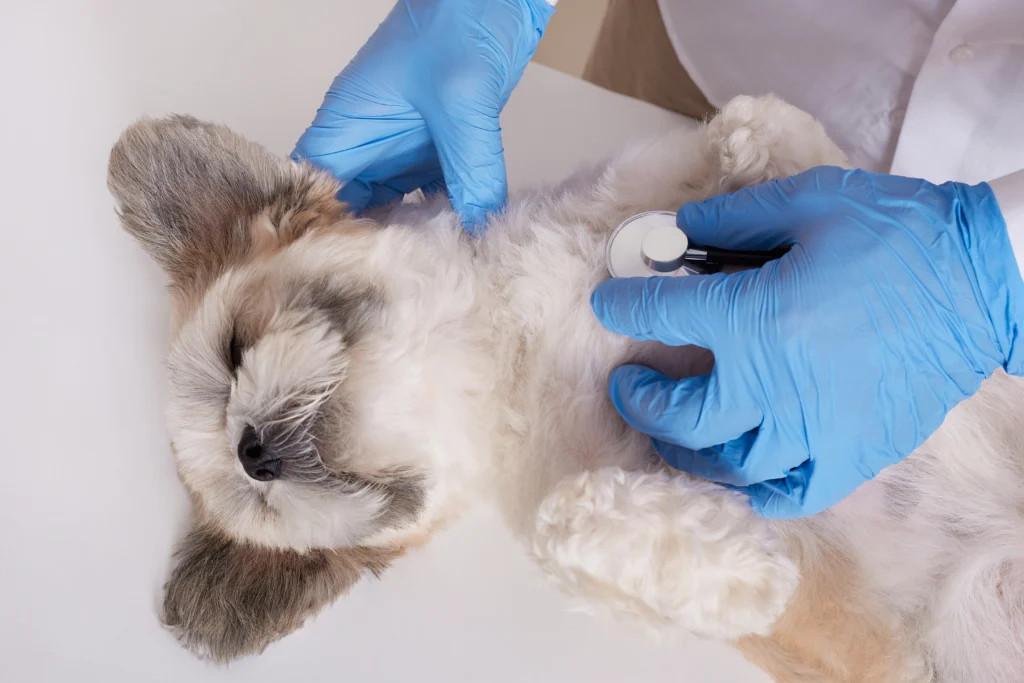
The Landscape of Dog Health and Veterinary Care Laws
Maryland, like many states, doesn’t have a single, overarching set of dog health and veterinary care laws. However, regulations are established through a combination of:
- Federal Laws: The federal government sets forth guidelines impacting veterinary practice, including animal welfare and medication use.
- State Regulations: The Maryland Department of Agriculture (MDA) oversees the licensing and practice standards for veterinarians in the state.
- Local Ordinances: Some counties or municipalities might have specific ordinances related to animal control or rabies vaccination requirements.
Veterinary Licensing and Practice
The Maryland Department of Agriculture’s Board of Veterinary Medical Examiners (SBVME) regulates the practice of veterinary medicine in the state. Here’s a breakdown of key points:
- Veterinarian Licensing: Only licensed veterinarians can diagnose and treat animal health conditions.
- Veterinary Technician Registration: Veterinary technicians can assist veterinarians under their direct supervision but cannot practice independently.
- Standards of Practice: The SBVME establishes and enforces standards of practice to ensure the ethical and competent care of animals by licensed veterinarians.
Finding the Right Veterinarian for Your Dog
Choosing the right veterinarian is crucial for your dog’s health and well-being. Here are some tips:
- Location and Convenience: Consider factors like proximity and appointment availability.
- Veterinarian Experience: Research the veterinarian’s experience and areas of expertise, especially if your dog has specific needs.
- Clinic Facilities: Ensure the clinic has appropriate equipment and resources to address your dog’s potential health concerns.
- Communication and Rapport: Choose a veterinarian you feel comfortable communicating with and who prioritizes your dog’s well-being.
Vaccinations and Parasite Prevention: Legal Requirements and Best Practices
While Maryland doesn’t have a central database for mandatory dog vaccinations, rabies vaccination is crucial for legal and health reasons:
- Rabies Vaccination: Rabies is a deadly virus for animals and humans. Most counties in Maryland require rabies vaccination for dogs over four months old. Always check with your local animal control agency for specific requirements and vaccination frequency.
- Other Vaccinations: While not legally mandated, other vaccinations like distemper, parvovirus, and leptospirosis are highly recommended to protect your dog from preventable diseases. Consult your veterinarian about the appropriate vaccination schedule for your dog.
- Parasite Prevention: Regular parasite prevention medication is essential to protect your dog from internal and external parasites like fleas, ticks, and heartworms.
Understanding Your Responsibilities as a Dog Owner
Owning a dog comes with legal and ethical responsibilities regarding their health:
- Providing Veterinary Care: Ensure your dog receives necessary preventive care, including vaccinations and parasite prevention.
- Seeking Treatment for Illness or Injury: If your dog exhibits signs of illness or injury, promptly seek veterinary attention.
- Animal Cruelty Laws: Maryland has animal cruelty laws in place. Failing to provide necessary veterinary care can be considered neglect and violate these laws.
Additional Considerations for Dog Health and Veterinary Care
Here are some additional points to keep in mind:
- Pet Insurance: Consider pet insurance to help manage potential veterinary costs associated with unexpected illness or injury.
- Veterinarian Recommendations: Always follow your veterinarian’s recommendations regarding your dog’s health care, including treatment plans, medication administration, and dietary guidance.
- Maintaining Medical Records: Keep a comprehensive file of your dog’s medical records, including vaccination history, test results, and treatment plans.
Dog Identification and Microchipping Laws in Maryland
Maryland, a state known for its vibrant cities and scenic landscapes, welcomes both residents and their furry companions. But ensuring your dog’s safety and well-being goes beyond playtime in the park. Proper identification plays a crucial role in reuniting you with your lost pet. This comprehensive guide explores dog identification and microchipping laws in Maryland, empowering you to take proactive steps towards keeping your canine friend safe and identifiable.
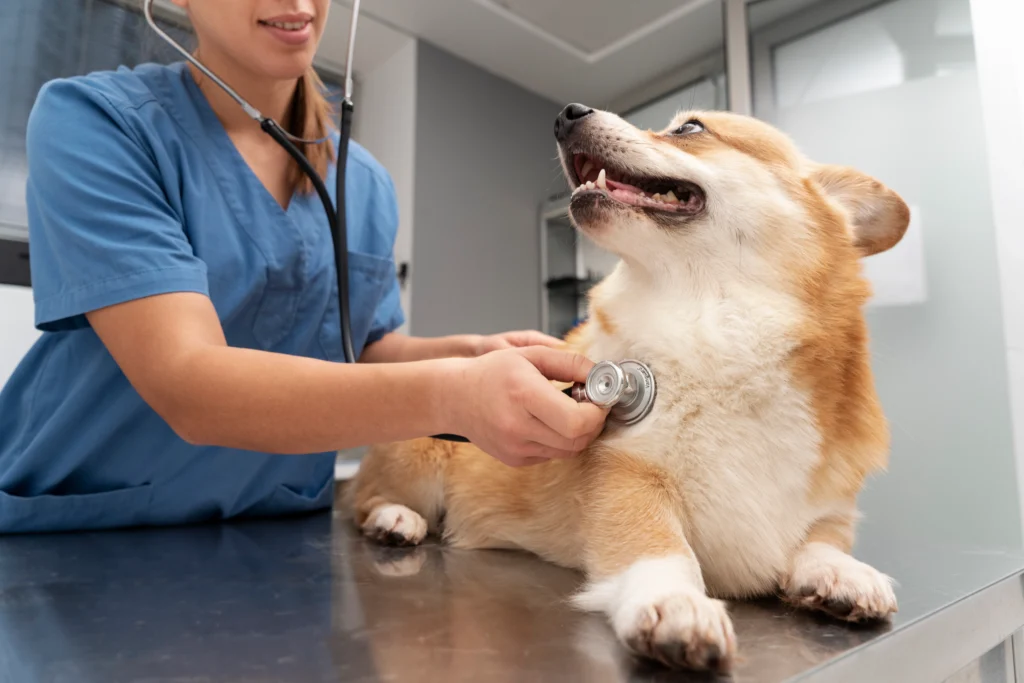
Dog Identification Laws in Maryland
While Maryland lacks a single, overarching law mandating specific dog identification methods, most counties and municipalities within the state require some form of identification for dogs:
- Licensing: Most counties in Maryland require dog licensing for all dogs over four months old. Licenses typically include a metal identification tag with a unique number.
- Collar and ID Tag: Many counties require dogs to wear a collar with an ID tag displaying the dog’s name, rabies vaccination tag, and owner contact information at all times.
Benefits of Dog Identification
Proper dog identification offers numerous benefits:
- Increased Chance of Reuniting with a Lost Dog: A collar with an ID tag and a license tag with contact information significantly increases the likelihood of your dog being returned to you if they get lost.
- Proof of Ownership: A license tag serves as proof of ownership in case of disputes or stray animal situations.
- Enforcement of Rabies Vaccination: License renewal usually requires up-to-date rabies vaccination proof, promoting public health and safety.
Finding Out About Your Local Dog Identification Requirements
Requirements for dog identification, including licensing and collar tags, can vary by county or municipality:
- Contact Your Local Animal Control Agency: The most reliable way to determine specific dog identification requirements in your area is to contact your local animal control agency. Their website might also have this information readily available.
- Visit Your County Government Website: Most county government websites have dedicated sections on animal control and pet licensing information.
Microchipping: A Permanent Solution for Dog Identification
While collars and ID tags are essential, microchipping offers a permanent and reliable method for dog identification:
- Microchip Implantation: A microchip is a tiny rice-grain sized chip implanted under your dog’s skin between the shoulder blades. It contains a unique identification number linked to your contact information in a national database.
- Scanning for Microchips: Veterinarians, animal shelters, and animal control agencies have scanners to read microchip information and reunite lost dogs with their owners.
The Advantages of Microchipping Your Dog
Microchipping your dog offers significant advantages:
- Permanent Identification: Unlike collars and ID tags, which can fall off or become unreadable, microchips offer permanent identification even if your dog loses their collar.
- Increased Recovery Rate: Studies indicate microchipped dogs are significantly more likely to be reunited with their owners if they get lost.
- Nationwide Database: Microchip information is linked to a national database accessible by animal shelters and veterinarians across the country.
Microchipping Laws and Considerations in Maryland
Maryland currently doesn’t have a statewide law mandating dog microchipping. However, microchipping is:
- Strongly Recommended: Veterinarians and animal welfare organizations highly recommend microchipping all dogs as a permanent and reliable identification method.
- Offered by Many Breeders and Shelters: Many reputable breeders and animal shelters microchip dogs before adoption, increasing their chance of a safe return if lost.
Taking Action to Identify Your Dog
Here are some steps you can take to ensure your dog is properly identified:
- Obtain a Dog License: Contact your local animal control agency to inquire about licensing requirements and obtain a license tag for your dog.
- Attach a Collar and ID Tag: Ensure your dog wears a well-fitting collar with an ID tag displaying their name, rabies vaccination tag, and your contact information.
- Microchip Your Dog: Schedule an appointment with your veterinarian to have your dog microchipped. Keep your contact information associated with the microchip updated.
Dog Breeding and Genetics Laws in Maryland
Maryland, a state rich in history and natural beauty, welcomes both residents and their canine companions. However, for those interested in dog breeding, understanding the legal framework surrounding breeding practices is crucial. This comprehensive guide explores dog breeding and genetics laws in Maryland, empowering responsible breeding and prioritizing animal welfare.

Dog Breeding Regulations in Maryland
Maryland employs a two-tiered system for regulating dog breeding:
- Statewide Kennel Licensing: The Maryland Department of Agriculture (MDA) issues kennel licenses to breeders selling dogs.
- Local Ordinances: Some counties and municipalities might have additional regulations specific to dog breeding within their jurisdictions.
Statewide Kennel Licensing Requirements
To obtain a kennel license in Maryland, breeders must meet the following criteria:
- Facility Requirements: The kennel facility must adhere to minimum standards for animal housing, sanitation, and veterinary care.
- Inspections: Licensed kennels are subject to inspections by the MDA to ensure compliance with regulations.
- Recordkeeping: Breeders are required to maintain records of breeding stock, litters, and sales.
Finding Out About Local Dog Breeding Ordinances
While a statewide kennel license exists, some counties or municipalities might have additional regulations for dog breeding:
- Contact Your County or Municipal Government: The most reliable way to determine if your area has specific dog breeding ordinances is to contact your county or municipal government office.
- Review Local Government Websites: Many local government websites have dedicated sections outlining animal control regulations, potentially including dog breeding ordinances.
The Importance of Responsible Dog Breeding
Responsible dog breeding goes beyond simply producing puppies. It prioritizes the health, well-being, and genetic diversity of the breed:
- Ethical Breeding Practices: Responsible breeders prioritize selective breeding to maintain breed standards while minimizing the risk of inheritable diseases.
- Health Testing: Reputable breeders conduct health screenings on breeding stock to reduce the chance of passing on genetic health problems to puppies.
- Proper Care and Socialization: Responsible breeders ensure puppies receive proper care, nutrition, and socialization during their critical development stages.
Factors to Consider for Ethical Dog Breeding
While licensing and regulations establish a baseline, ethical dog breeding goes beyond legal requirements:
- Breed Club Membership: Consider belonging to a reputable breed club dedicated to the breed you’re interested in. These clubs often have ethical breeding guidelines and resources for responsible breeders.
- Veterinarian Collaboration: Maintain a strong relationship with a qualified veterinarian who can provide guidance on health testing, breeding practices, and puppy care.
- Transparent Communication: Be transparent with potential buyers about the breed’s characteristics, potential health concerns, and responsible pet ownership expectations.
Understanding Genetics and Avoiding Puppy Mills
Understanding basic canine genetics is crucial for responsible breeding:
- Genetic Diversity: Maintain genetic diversity within the breed to minimize the risk of inheritable diseases.
- Avoiding Inbreeding: Excessive inbreeding can lead to health problems in puppies.
- Puppy Mills: Puppy mills prioritize profit over animal welfare, often breeding dogs in inhumane conditions. Avoid purchasing puppies from puppy mills.
The “No More Puppy-Mill Pups Act” of 2018
In 2018, Maryland enacted the “No More Puppy-Mill Pups Act,” effectively prohibiting the retail sale of dogs and cats obtained from commercial breeding facilities known as puppy mills. This emphasizes the state’s commitment to ethical breeding practices.
Alternatives to Dog Breeding
If you’re passionate about a particular breed but not interested in breeding, consider these alternatives:
- Volunteering with Breed Rescues: Many breed-specific rescues care for dogs in need of loving homes. Volunteering your time and expertise can significantly help these organizations.
- Supporting Reputable Breeders: If you decide to purchase a puppy, choose a reputable breeder who prioritizes ethical breeding practices and animal welfare.
Dog Environmental Impact Laws in Maryland
Maryland, a state known for its stunning landscapes and vibrant communities, welcomes both residents and their furry companions. But with canine companions comes environmental responsibility. Understanding the impact dogs can have on the environment and any related laws empowers you to be a more eco-conscious dog owner.

The Environmental Impact of Dogs
While dogs bring joy and companionship, their presence can have an impact on the environment:
- Waste Management: Dog waste left uncollected can pollute waterways, harm wildlife, and contribute to unpleasant odors.
- Habitat Disruption: Off-leash dogs roaming in sensitive areas can disrupt wildlife habitats and disturb nesting grounds.
- Water Contamination: Excess dog waste can contaminate waterways when left uncollected, impacting water quality for humans and wildlife.
Dog Waste Management Laws
While Maryland doesn’t have a single, overarching law regarding dog waste management, most counties and municipalities have ordinances in place:
- Pooper Scooper Laws: Most areas require dog owners to pick up after their dogs in public spaces and dispose of waste properly. Failing to do so might result in fines.
- Leash Laws: Many parks and natural areas have leash laws in place to restrict dog movement and minimize disruption to wildlife habitats.
Local Dog Waste Management Laws
Specific dog waste management and leash laws can vary by location:
- Contact Your Local Animal Control Agency: The most reliable source for information on local dog waste management and leash laws is your local animal control agency. Their website might also have this information readily available.
- Review Local Park Regulations: Many parks have signage outlining leash requirements and waste disposal procedures.
Responsible Dog Ownership: Minimizing Your Dog’s Environmental Impact
Here are some ways to be a responsible dog owner and minimize your dog’s environmental impact:
- Always Carry Waste Disposal Bags: Make it a habit to carry waste disposal bags on walks and hikes to clean up after your dog.
- Dispose of Waste Properly: Never leave dog waste behind. Dispose of it in designated waste bins or tie it in a bag and place it in a regular trash can.
- Respect Leash Laws: Observe leash laws in parks and natural areas. This protects wildlife habitats and minimizes disruption to other park users.
- Educate Others: Encourage other dog owners to practice responsible waste management and leash etiquette.
Environmental Considerations for Dog Owners
Here are some additional ways to be an eco-conscious dog owner:
- Eco-Friendly Pet Products: Consider using eco-friendly dog waste bags made from recycled materials.
- Sustainable Food Choices: Explore sustainable dog food options with minimal environmental impact.
- Water Conservation: Use a portable water bowl to avoid relying on disposable water bowls for walks.
- Reduce, Reuse, Recycle: Recycle old dog toys and bedding whenever possible.
Dog Parks and Environmental Sustainability
Dog parks can provide a fun and social outlet for dogs, but maintaining them requires resources:
- Sustainable Dog Park Design: Look for dog parks with features like permeable surfaces and waste disposal stations to minimize environmental impact.
- Responsible Dog Park Use: Respect park rules regarding waste disposal and leash use to ensure a clean and sustainable environment for all dog park users.
Dog Behavioural Training Laws in Maryland
Maryland, a state known for its rich history and charming communities, welcomes both residents and their canine companions. But ensuring a harmonious coexistence requires well-behaved dogs. Understanding dog behavioral training laws in Maryland empowers you to address potential issues and promote responsible pet ownership.
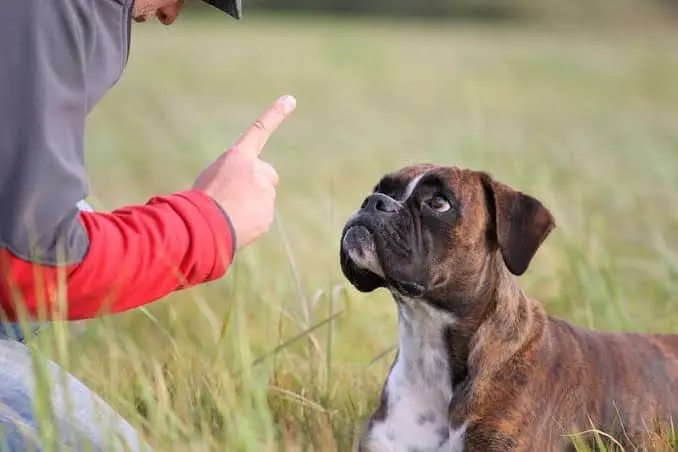
The Landscape of Dog Behavioral Training Laws
Maryland does not have specific laws mandating dog behavioral training for all dogs. However, the state creates a framework for addressing behavioral concerns through a combination of:
- Leash Laws and Animal Control Ordinances: Most counties and municipalities have leash laws and animal control ordinances that can indirectly influence dog training practices.
- Nuisance Barking and Aggressive Dog Laws: Some areas have laws addressing excessive barking or aggressive dog behavior, potentially requiring training interventions.
- Veterinarian and Animal Trainer Recommendations: Veterinarians and qualified animal trainers can recommend behavioral training solutions based on your dog’s specific needs.
Leash Laws and Animal Control Ordinances
Leash laws and animal control ordinances can indirectly influence dog training practices:
- Leash Laws: Enforceable leash laws in most public spaces promote controlled behavior and encourage responsible dog walking habits. Exposure to leash training lays the groundwork for better control and obedience.
- Animal Control Ordinances: These ordinances often address issues like public nuisance barking or aggressive behavior. Addressing these concerns might require training interventions to modify your dog’s behavior.
Nuisance Barking and Aggressive Dog Laws
Some Maryland counties and municipalities have laws addressing excessive barking or aggressive dog behavior:
- Nuisance Barking: Excessive or prolonged barking can be considered a nuisance and might lead to fines for the owner. Training your dog basic commands like “quiet” or “enough” can help address nuisance barking.
- Aggressive Dog Laws: Laws might exist regarding dangerous or aggressive dogs. These situations might require professional behavior modification training by a qualified trainer.
Local Dog Behavioral Training Regulations
Specific regulations regarding leash laws, animal control ordinances, and nuisance barking can vary by location:
- Contact Your Local Animal Control Agency: The most reliable source for information on local animal control ordinances and potential training requirements is your local animal control agency. Their website might also have this information readily available.
- Review Local Government Websites: Many county government websites have dedicated sections on animal control regulations, potentially outlining leash laws and nuisance barking ordinances.
The Importance of Responsible Dog Ownership and Behavioral Training
Investing in behavioral training for your dog offers numerous benefits:
- Safer Interactions: Proper training promotes better control, leading to safer interactions with other pets, people, and wildlife.
- Reduced Behavioral Issues: Training can address common issues like barking, jumping, chewing, or leash aggression.
- Enhanced Quality of Life: Well-trained dogs are more enjoyable companions and can participate in more activities with their owners.
Finding a Qualified Dog Trainer in Maryland
When seeking a qualified dog trainer, consider these factors:
- Certification and Experience: Look for trainers with certifications from reputable organizations and experience working with your dog’s breed and specific needs.
- Training Methods: Choose a trainer who utilizes positive reinforcement methods based on mutual respect and clear communication.
- Positive Reviews and Recommendations: Research recommendations and reviews from other dog owners to find a reputable dog trainer in your area.
Dog Protection and Rescue Laws in Maryland
Maryland, a state rich in historical charm and vibrant communities, welcomes both residents and their furry companions. But ensuring the safety and well-being of your canine friend goes beyond walks in the park. Understanding dog protection and rescue laws empowers you to be a responsible dog owner and advocate for those in need. This comprehensive guide explores the legalities surrounding animal welfare and rescue efforts in Maryland, equipping you to play a role in protecting vulnerable dogs.

The Legal Framework for Dog Protection in Maryland
Maryland has a multi-layered approach to dog protection, incorporating both federal and state laws:
- Federal Laws: The Animal Welfare Act (AWA) sets forth minimum care standards for animals, including dogs, housed in commercial breeding facilities, research institutions, and pet stores.
- Maryland Code: Articles within the Maryland Code address animal cruelty and neglect, outlining legal repercussions for violations.
- Local Animal Control Ordinances: Many counties and municipalities have animal control ordinances that establish additional regulations and procedures for animal welfare concerns.
Animal Cruelty and Neglect Laws
Maryland, like most states, has animal cruelty and neglect laws in place:
- Animal Cruelty: This encompasses acts of intentional harm, torture, or neglect that inflict unnecessary pain or suffering on an animal.
- Animal Neglect: This involves failing to provide the basic necessities for an animal’s survival, such as food, water, shelter, and veterinary care.
Reporting Suspected Animal Cruelty or Neglect
If you suspect a dog is being subjected to cruelty or neglect, it’s crucial to take action:
- Contact Your Local Animal Control Agency: They have the authority to investigate animal welfare concerns and potentially remove animals from abusive situations.
- Maryland State Police: In more serious cases, you can contact the Maryland State Police.
- Animal Welfare Organizations: Some animal welfare organizations have hotlines to report suspected animal cruelty.
The Role of Animal Shelters and Rescue Organizations
Animal shelters and rescue organizations play a critical role in protecting dogs in need:
- Animal Shelters: These government-run or non-profit organizations house stray, abandoned, or surrendered dogs. They strive to find these dogs loving forever homes.
- Rescue Organizations: These organizations often focus on specific breeds, rescue efforts from puppy mills, or dogs with special needs.
Adopting a Dog from a Shelter or Rescue
Giving a deserving dog a second chance can be a rewarding experience. Here’s what to consider when adopting:
- Research Shelters and Rescues: Find reputable shelters or rescues that align with your values and adoption criteria.
- Adoption Process: Expect an adoption process that might involve an application, interview, and home visit.
- Meeting Potential Matches: Spend time interacting with different dogs to find a good fit for your lifestyle.
Laws and Regulations Surrounding Dog Rescue Organizations
While Maryland doesn’t have a single, overarching law governing dog rescue organizations, some regulations exist:
- Non-Profit Status: Many rescue organizations operate as non-profit entities, requiring adherence to specific tax-exempt regulations.
- Fundraising and Donations: Regulations surround fundraising activities and the proper handling of donations received by rescue organizations.
- Licensing Requirements: Some counties or municipalities might have specific licensing requirements for dog rescue organizations operating within their jurisdiction.
Finding Reputable Dog Rescue Organizations
When considering adopting from a rescue organization, ensure its reputation:
- Research the Organization: Look for organizations with a history of responsible rescue practices and ethical animal care.
- Transparency and Openness: Choose a rescue that is transparent about its adoption process, dog welfare practices, and financial information.
- Reviews and Recommendations: Read online reviews and seek recommendations from previous adopters or volunteers.
Responsible Dog Ownership and Advocacy
Responsible dog ownership and animal welfare advocacy go beyond legal requirements:
- Provide Proper Care: Ensure your dog receives all necessary vaccinations, preventative care, and a healthy lifestyle.
- Microchip Your Dog: Microchipping increases the chances of your dog being reunited with you if they get lost.
- Identify Responsible Breeders: If considering purchasing a puppy, research reputable breeders who prioritize ethical breeding practices and animal welfare.
- Support Animal Welfare Organizations: Volunteer your time or donate to animal shelters and rescue organizations that make a difference.
Dog Entertainment and Work Laws in Maryland
Maryland, a state known for its stunning landscapes and rich history, welcomes both residents and their furry companions. But for those interested in involving their dogs in entertainment or work activities, understanding the legal framework is crucial. This comprehensive guide explores dog entertainment and work laws in Maryland, empowering responsible participation and prioritizing animal welfare.

The Legal Landscape: A Multi-Tiered Approach
Maryland utilizes a multi-tiered system of laws regulating dog participation in entertainment and work activities:
- Federal Laws: The Animal Welfare Act (AWA) sets forth minimum care standards for animals, including dogs, used in exhibitions, performances, and transportation related to such activities.
- Maryland Code: Sections of the Maryland Code address animal cruelty and neglect, outlining legal repercussions for violations.
- Local Ordinances: Some counties and municipalities might have additional regulations specific to dog entertainment or work within their jurisdiction.
Understanding Animal Welfare Considerations
Animal welfare is paramount when considering involving your dog in entertainment or work:
- Species-Appropriate Activities: Dogs should only participate in activities that align with their natural instincts and abilities.
- Proper Training and Conditioning: Dogs participating in work or entertainment activities require proper training and conditioning to ensure safety and well-being.
- Humane Treatment: All dog entertainment and work activities must adhere to humane treatment principles, prioritizing their comfort and avoiding unnecessary stress.
Dog Entertainment Laws in Maryland
Maryland doesn’t have specific laws solely focused on dog entertainment. However, existing animal cruelty and neglect laws, in conjunction with federal regulations, apply:
- Film and Television Productions: The AWA governs animal handling and welfare standards in film and television productions involving dogs. Permits might be required from the U.S. Department of Agriculture (USDA).
- Dog Shows and Competitions: Organizations hosting dog shows or competitions might have specific regulations regarding dog health, breed standards, and acceptable handling practices.
- Traveling Shows and Circuses: Federal regulations under the AWA apply to dogs used in traveling shows or circuses. Violations can result in fines or even a ban on exhibiting animals.
Local Dog Entertainment Regulations
Regulations for dog entertainment activities might vary by location:
- Contact Your Local Animal Control Agency: They can provide information on any specific local ordinances governing dog entertainment activities within your area.
- Review Film Permitting Processes: If considering involving your dog in film or television productions, research the local film permitting process and any associated animal welfare regulations.
Dog Work Laws in Maryland
Similar to dog entertainment, Maryland lacks specific laws solely focused on dog work activities. However, existing regulations still apply:
- Service Animals: Federal laws protect the rights of individuals with disabilities to be accompanied by trained service animals in public spaces.
- Working Dogs in Specific Fields: Laws and regulations might exist for specific working dog professions like search and rescue or law enforcement K-9 units. Such regulations are typically established at the agency level.
- General Animal Welfare Laws: All work activities involving dogs must adhere to animal cruelty and neglect prevention laws, prioritizing their physical and mental well-being.
Important Considerations for Dog Work Activities
Here are some key factors to consider when involving your dog in work activities:
- Breed and Temperament: Choose dogs with suitable breeds and temperaments for the specific work required.
- Training and Certification: Ensure your dog receives proper training and certification, if applicable, to excel in the designated work role.
- Veterinarian Approval: Consult your veterinarian to assess your dog’s physical fitness and suitability for the desired work activity.
Resources for Responsible Dog Work Activities
Several resources can guide you towards responsible dog work practices:
- National Association of Professional Pet Trainers (NAPP): Offers resources and certification programs for animal training professionals, including those specializing in working dogs.
- Industry-Specific Organizations: Organizations related to specific working dog fields, like search and rescue or detection dogs, might have training guidelines and resources.
- American Kennel Club (AKC): The AKC Canine Good Citizen (CGC) program provides a foundation for obedience training, which can be beneficial for various dog work activities.
Dog Technology and Innovation Laws in Maryland
Maryland, a state known for its vibrant cities and historical charm, welcomes both residents and their furry companions. Technology is constantly evolving, and the world of dog care is no exception. Understanding the laws surrounding dog tech products and innovations in dog health technology empowers you to make informed decisions for your canine friend. This comprehensive guide explores the legal landscape of dog technology in Maryland, equipping you to navigate this exciting frontier responsibly.

The Evolving Landscape of Dog Technology
The pet tech industry is booming, offering innovative products and solutions for dog care. Here are some key areas of development:
- Wearable Tech: Smart collars, GPS trackers, and activity monitors can track your dog’s location, health data, and activity levels.
- Remote Training Devices: Electronic collars and training tools utilizing sound or vibration can be used for remote training purposes.
- Telehealth and Virtual Vet Care: Emerging technologies allow for virtual consultations with veterinarians, potentially increasing access to veterinary care.
- Automated Feeders and Food Delivery Systems: Automated feeders offer convenience and portion control for dog feeding.
- Smart Toys and Interactive Games: Interactive toys can stimulate your dog mentally and keep them engaged.
Current Legal Landscape
Maryland doesn’t have a single, comprehensive law governing all dog tech products. However, existing regulations and standards come into play, depending on the specific technology:
- Federal Regulations: The Federal Trade Commission (FTC) regulates product safety and consumer protection, including certain pet tech products.
- American Society for the Prevention of Cruelty to Animals (ASPCA): The ASPCA provides guidelines on the ethical use of electronic training devices.
- Veterinarian Oversight: Some innovations, like telehealth consultations, might require veterinarian involvement or approval for proper utilization.
Important Considerations for Dog Tech Use
While dog tech offers exciting possibilities, responsible use is crucial:
- Prioritize Animal Welfare: Always prioritize your dog’s comfort and well-being above convenience or novelty.
- Research and Choose Reputable Products: Research the functionality, safety, and ethical considerations before acquiring any dog tech product.
- Consult Your Veterinarian: Discuss your dog’s specific needs and suitability for any dog tech product with your veterinarian.
- Proper Training and Supervision: Ensure proper training and supervision when using remote training devices or introducing any new technology to your dog.
The Future of Dog Health Technology and Potential Legal Implications
As dog health technology advances, new legal considerations might emerge:
- Data Privacy: Regulations regarding data collection and privacy related to your dog’s health information through wearables might evolve.
- Veterinary Licensing and Telehealth Standards: Laws regarding veterinarian licensing and standards of care for telehealth consultations might be refined.
- Emerging Technologies: As technologies like implantable health monitors or AI-powered training tools are developed, legal frameworks might need to adapt.
Staying Informed About Dog Tech Laws and Regulations
The world of dog tech is constantly evolving, so staying informed is essential:
- Follow Reputable Dog Tech Websites and Publications: Subscribe to reputable dog tech news sources and publications to keep up with the latest advancements and potential legal considerations.
- Consult Your Veterinarian: Your veterinarian can provide guidance on the suitability of specific dog tech products for your dog’s needs and any potential legal implications.
- Monitor Government Websites: Government websites might have sections dedicated to consumer protection and potential regulations related to pet tech products.
Human Coexistence Laws in Maryland
Maryland, a state rich in natural beauty and friendly communities, welcomes both residents and their four-legged companions. But fostering a harmonious relationship goes beyond just sharing a roof. Understanding laws promoting cohabitation and bonding between dogs and humans in Maryland empowers responsible pet ownership and strengthens the human-animal connection.

The Fabric of Human-Dog Coexistence
Laws in Maryland directly and indirectly influence how humans and dogs co-exist:
- Leash Laws and Public Access: Laws mandating leash use in public spaces promote control and responsible dog walking, facilitating safe interactions between dogs and people.
- Park Regulations and Dog-Friendly Spaces: Many parks have designated dog park areas, fostering social interaction for dogs and providing opportunities for off-leash play in controlled environments.
- Animal Welfare Laws: Laws against cruelty and neglect prioritize the well-being of dogs, fostering a foundation for positive human-dog relationships.
Leash Laws and Public Access
Leash laws play a significant role in promoting safe cohabitation:
- Leash Requirements: Most Maryland counties and municipalities have leash laws requiring dogs to be on a leash in public spaces like sidewalks, parks (except designated dog park areas), and trails.
- Responsible Dog Walking: Leash laws ensure control and predictability of dog behavior, minimizing potential conflicts with other dogs or people in public spaces.
- Respecting Others: Following leash laws demonstrates courtesy to other dog owners and pedestrians, fostering a more positive environment for everyone.
Local Leash Laws and Public Access Regulations
Specific leash laws and public access regulations can vary by location:
- Contact Your Local Animal Control Agency: They have the most up-to-date information on leash laws and designated dog park areas within your jurisdiction.
- Review Local Park Regulations: Park websites or signage often outline leash requirements and dog park etiquette.
The Importance of Dog-Friendly Spaces and Park Regulations
Maryland offers numerous dog-friendly spaces to promote positive human-dog interaction:
- Designated Dog Park Areas: Many parks have fenced-in areas where dogs can socialize and play off-leash under responsible supervision.
- Public Dog Walking Trails: Some trails allow dogs on leash, providing opportunities for exercise and exploration for both humans and canines.
- Dog-Friendly Businesses: A growing number of businesses welcome well-behaved dogs, allowing pet owners to integrate their furry companions into more activities.
Understanding Dog Park Regulations and Etiquette
Dog parks can be a great resource for dogs and their owners, but following park regulations is crucial:
- Vaccination Requirements: Most dog parks require proof of current vaccinations for all dogs using the facility.
- Waste Disposal: Dog park users are responsible for cleaning up after their dogs, maintaining a clean and sanitary environment.
- Supervised Interactions: Owners should always supervise their dogs while in the dog park and be mindful of their dog’s behavior to ensure safe interactions with other dogs.
Animal Welfare Laws and Their Role in Human-Dog Bonding
Maryland’s animal welfare laws indirectly promote human-dog bonding:
- Prevention of Cruelty and Neglect: Laws protecting animals from cruelty and neglect create a foundation of trust and respect between humans and dogs.
- Importance of Proper Care: Laws ensure dogs receive basic necessities like food, water, shelter, and veterinary care, fostering a healthy relationship with their owners.
- Responsible Ownership: Animal welfare laws encourage responsible pet ownership, leading to stronger human-dog bonds built on trust and well-being.
Fostering a Strong Human-Dog Bond
Laws provide a framework, but building a strong human-dog bond requires proactive efforts:
- Positive Reinforcement Training: Positive reinforcement training methods based on mutual respect and clear communication strengthen human-dog bonds while promoting good behavior.
- Quality Time and Activities: Engaging in activities like walks, playtime, or training sessions fosters a connection between dog and owner.
- Meeting Your Dog’s Needs: Understanding your dog’s breed-specific needs and providing adequate exercise, mental stimulation, and affection is crucial for a happy and bonded dog.
Maryland welcomes canine companions, but coexisting harmoniously requires understanding dog laws. This guide explored various aspects, from behavioral training and protection to entertainment and work regulations. Responsible dog ownership is key. Leash laws promote safety, dog parks foster socialization, and animal welfare laws ensure well-being. By complying with dog laws, you not only protect your furry friend but also contribute to a safer and more enjoyable environment for everyone in Maryland. Remember, informed dog ownership builds a strong human-animal bond, enriching the lives of both dogs and their human companions.
Other Relevant Dog Laws in Maryland
Canine Good Citizen (CGC) Programs and Legal Benefits in Maryland:
- CGC Programs: The American Kennel Club (AKC) offers Canine Good Citizen (CGC) programs that certify well-mannered and socialized dogs. While not legally mandated, CGC certification might:
- Demonstrate responsible ownership to landlords considering dog-friendly rentals.
- Potentially qualify your dog for discounts on pet insurance (contact your insurer for details).
Dog Insurance and Coverage Laws in Maryland:
- Dog Insurance: Maryland doesn’t mandate dog insurance, but it’s a wise investment.
- Coverage: Dog insurance policies vary, so compare plans to find coverage for accidents, illnesses, and even liability in case of dog bites (check with your insurer for specifics).
Laws Regarding Dogs in Hot Cars and Animal Endangerment in Maryland:
- Heatstroke Risks: Leaving a dog unattended in a hot car can be dangerous and even fatal. Maryland has animal cruelty and neglect laws that can be applied in such situations.
- Reporting Concerns: If you see a dog left in a hot car, contact animal control immediately or call the police if the situation seems life-threatening.
Legal Aspects of Dog Parks and Shared Spaces in Maryland:
- Dog Park Regulations: These vary by location, but typically cover leash requirements, vaccination proof, waste disposal procedures, and responsible dog owner behavior.
- Shared Responsibility: Dog park users share responsibility for maintaining a safe and enjoyable environment for all dogs and owners. Be mindful of your dog’s behavior and respect other park users.
Dog-Related Property Damage and Homeowner’s Insurance in Maryland:
- Liability: In cases of dog-related property damage, your homeowner’s insurance might cover the costs depending on the specific circumstances and policy details.
- Review Your Policy: It’s crucial to understand your homeowner’s insurance policy regarding dog-related liability and coverage limitations.
Service and Working Dog Laws in Employment and Public Access in Maryland:
- Federal Laws: The Americans with Disabilities Act (ADA) protects the rights of individuals with disabilities to be accompanied by trained service animals in public spaces.
- State and Local Laws: Maryland might have additional laws regarding specific working dogs like search and rescue or law enforcement K-9 units.
Animal Welfare and Protection Laws Against Neglect and Abandonment in Maryland:
- Animal Cruelty and Neglect: Maryland has laws against animal cruelty and neglect, ensuring basic necessities are provided for dogs and preventing intentional harm.
- Reporting Concerns: If you suspect animal neglect or cruelty, report it to your local animal control agency or the Maryland State Police.
FAQs
Can I take my dog swimming in public areas like lakes or beaches?
Maryland regulations regarding dogs in public swimming areas can vary by location. It’s best to contact your local parks department or check signage at the specific beach or lake to determine leash requirements and any restrictions on dog swimming.
Are there any breed-specific laws in Maryland?
Maryland doesn’t have statewide breed-specific bans or restrictions. However, some municipalities might have ordinances targeting specific breeds considered potentially dangerous. It’s advisable to check with your local animal control agency for any breed-related regulations in your area.
What happens if my dog bites someone?
Maryland follows a “one-bite rule” in most dog bite cases. This means the dog owner is not liable for the first bite if the dog has no prior history of aggression. However, subsequent bites or attacks can result in legal action and potential liability for the owner. It’s crucial to maintain proper vaccinations and consider liability insurance for your dog.
Can my landlord restrict dog breeds or sizes in my apartment building?
Yes, landlords in Maryland can set restrictions on dog breeds or sizes in their rental properties. These restrictions should be outlined in the lease agreement.
What are the regulations for traveling with my dog in Maryland?
Maryland doesn’t have specific laws regarding traveling with your dog within the state. However, some public transportation options might have restrictions on pet travel. Always check with the specific carrier (bus, train) for their pet policies and any necessary documentation (vaccination records) for your dog to travel with you.

